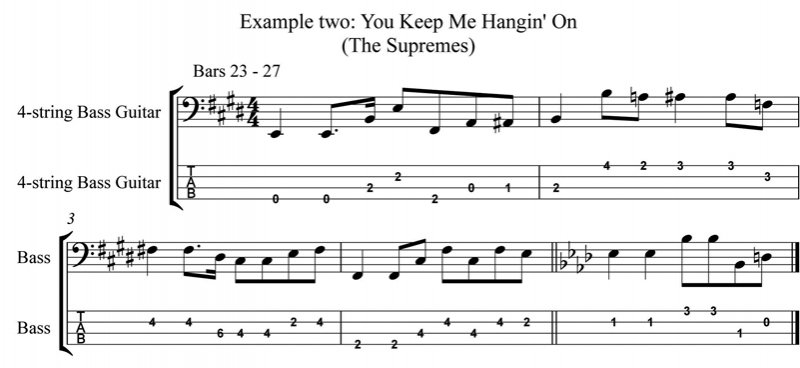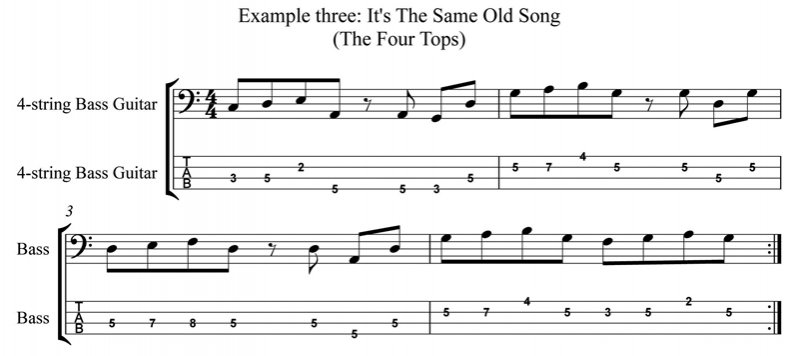Deep Thinking: Funk Meets Jazz – James Jamerson (1936-’83)
Deep Thinking: Funk Meets Jazz – James Jamerson (1936-’83)
As promised in the last issue, we are going to look at some of the aspects of James Jamerson’s bass playing that made him an individualist who has influenced bass players since the early days of the Tamla Motown record company.
I could write the whole column about the Motown production line process of producing a constant stream of hit records – Berry Gordy, the label’s founder, had worked for the Ford Motor Company in Detroit, so probably saw his label as a production line in a similar way.
There are many online debates about which musicians played on which records, given that once Motown moved to Los Angeles, the pool of their musicians increased. Jamerson didn’t like LA and returned to Detroit. The label often made several demos of each song before releasing one of them as a master and the producers did not keep note of which musicians were on any particular version, hence the heated debates one can visit on the web (although I avoid them having seen some very uninformed stuff being said). Needless to say, The Funk Brothers, the regular Motown house band, played on the majority of the hits produced by the label. I have chosen sections of three songs that Jamerson did play on, Reach Out And I’ll Be There by The Four Tops, You Keep Me Hangin’ On by The Supremes, and It’s The Same Old Song, again by The Four Tops.
The verse line in Reach Out demonstrates Jamerson’s use of harmony as a jazz musician (he was also a double bassist). You’ll notice that he uses passing notes that most Afro-American funk bassists would avoid. Notice the G at the end of the second bar of the verse that returns to the Ab, the root note of the Abmin7 chord played by the guitars and keys. This is known as the leading note (the seventh note of a major scale). Most often in funky pop, a bassist would use Gb to return to Ab. Later in the verse, he uses A natural as a passing note between Ab and Bb, this chromatic movement is also common in the jazz that Jamerson was happiest playing. He also uses dead notes for a percussive effect and, unlike the bassists in the last issue of NZM, he often plays quaver pushes across bars while the drums are playing on the beat.
I have transcribed bars 23 to 27 of You Keep Me Hangin’ On. In bar 23, he moves from low E to E an octave higher with the fifth note of the E major scale, B, in between. At the end of the bar, however, he has his trademark passing notes, this time its A, A# and then B, which is followed by B an octave higher, A natural and A#. He then plays F a fourth below, which moves up a semitone to F# for two bars, 25 and 26, which are centred around an F# chord. At the end of bar 26, however, we find another passing note, E, which takes the line to Eb at the beginning of bar 27.
It’s The Same Old Song is much simpler in that Jamerson uses major scale harmony. Each bar in both the verse and chorus uses the root note, second and third notes of the chord scale and the whole line is very pentatonic in nature. It’s a straightforward line when compared to the two other songs I’ve transcribed, yet it is evidence that Jamerson could also provide a driving and memorable, yet simplistic, melodic line when required.
For those interested in his equipment, he used Fender Precision basses with very heavy La Bella .110s strings. His fingerboard action was extremely high, probably like his double bass, and he only picked with his right hand index finger. His amplifier of choice in the studio was an Ampeg B15N, although there is a clip on Youtube of him performing Whats Going On in a live concert with Marvin Gaye and he is using a Fender Dual Showman. See you next issue.
Dr. Rob Burns is an Associate Professor in Music at the University of Otago in Dunedin. As a former professional studio bassist in the UK, he performed and recorded with David Gilmour, Pete Townsend, Jerry Donahue, Isaac Hayes, Sam and Dave, James Burton, Ian Paice and Jon Lord, Eric Burdon and members of Abba. He played of the soundtracks of many UK television shows, such as Red Dwarf, Mr. Bean, Blackadder, Not the Nine OClock News and Alas Smith and Jones. Rob is currently a member of Dunedin bands Subject2change and The Verlaines.


